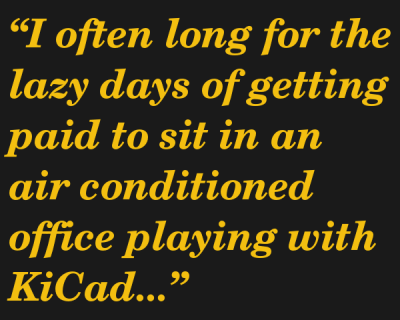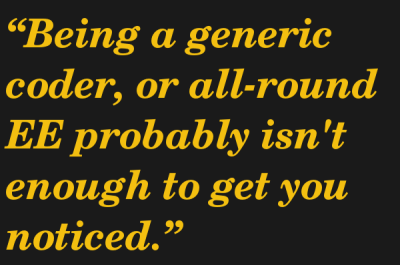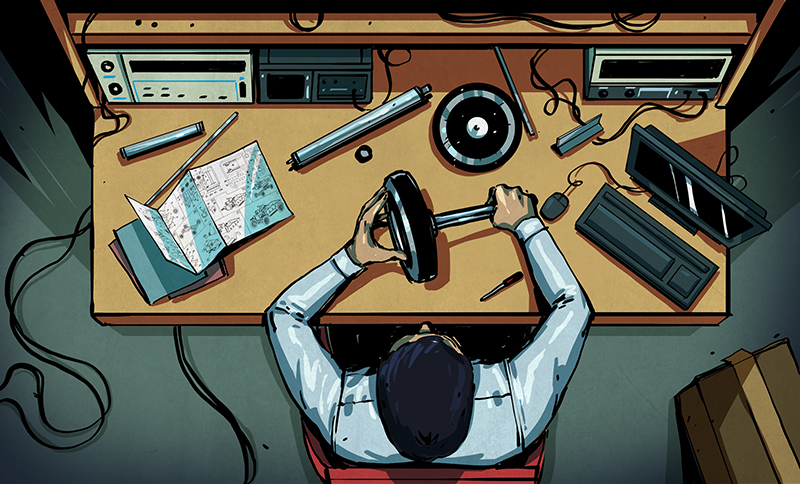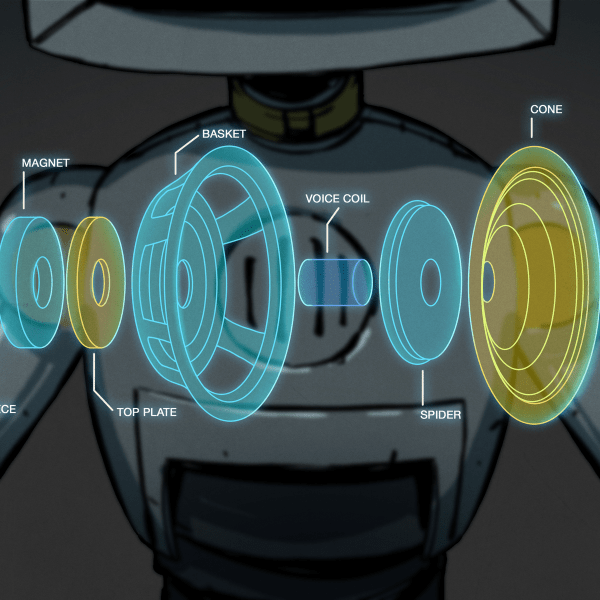The following is my personal advice, it probably doesn’t apply to all contractors, but it’s certainly applied to me. When you start contracting, your most pressing question is probably “how do I find clients” so here’s what little I’ve learned so far…
1. Don’t
For some, contracting is seen as a potential escape route from the hum-drum of a dull, often political office environment. But contracting isn’t always the answer. Pay, while often better, is inconsistent. I’ve had clients pay two months late (and think it’s normal), pay the wrong amount (due to misunderstanding currency conversion) and just plain forget to sign off an invoice. Chasing down these invoicing issues will all be your job. Clients will say “we’ll definitely hire you” and then a contract will never happen.
 You might think you can just hack on an interesting project and send off your deliverables, avoiding all the other annoyances that come with an office job. It often doesn’t work that way either. Clients often don’t know what they want, and will ask you to help them slowly iterate toward a solution. Many client political issues can crop up in a contracting context too. You might have some distance from these issues, but ultimately they still exist.
You might think you can just hack on an interesting project and send off your deliverables, avoiding all the other annoyances that come with an office job. It often doesn’t work that way either. Clients often don’t know what they want, and will ask you to help them slowly iterate toward a solution. Many client political issues can crop up in a contracting context too. You might have some distance from these issues, but ultimately they still exist.
I’ll be honest, when I’m at home working on a contract with toddler trying to draw on my face, I often long for the lazy days of getting paid to sit in an air conditioned office playing with KiCad because management can’t quite make up their mind about exactly what they want to do next. That kind of job security doesn’t exist with contracting.
So… if you’re looking for an escape route, consider other options. Can you bootstrap a small business to give you the life style you’re looking for? Would you ultimately be happier with venture funding (that brings its own evils) and starting your own thing?
2. Also Don’t
Seems you’re still reading and I’ve not yet managed to convince you contracting isn’t the answer. So you really want to start searching for clients huh? My suggestion here is also don’t.
I’ve tried contacting people in my industry, firing out 5 to 10 emails a day. I’ve set up accounts on bottom dollar freelancer websites and bid for work. Sometimes this leads to interesting conversations, but never actual work. There are only two ways I’ve got work:
- Personal Contacts
- People who cold-contact me via my blog
Personal contacts can come from anywhere. This might be an old colleague, or someone you’ve chatted to about work in the past. In my experience, if you’ve had good conversations and they’re looking for someone there’s a strong possibility they’ll reach out to you. But don’t push yourself on them, these are people in the industry who you are really just having an honest and open conversation with. If they have work, and you make contact semi-regularly it might turn into a contract for you. Do try to get into the habit of providing value to your industry contacts. If you’ve heard something, or seen something that they’ve likely not seen and is genuinely interesting, email them.
An example is a contract I got recently. I helped a friend pitch a company that ultimately didn’t get funded. But because of that I met a bunch of new people, and ultimately secured a small contract.
The other route is the blog, I’ve written a few posts around the niche in which I work. The supplied novel industry analysis wasn’t available elsewhere, but my niche is small and probably only a few thousand people read these posts. However they’re the right people, and helped secure contracts worth about $100k as well as prompting many other interesting conversations.
 Now, I’m not saying don’t cold-contact people. Do that too! But focus on just having conversations with people and better understanding the industry regardless of whether there’s work in it.
Now, I’m not saying don’t cold-contact people. Do that too! But focus on just having conversations with people and better understanding the industry regardless of whether there’s work in it.
And if you do happen to write a cool blog post, send the link to us!
3. Have a niche
Being a generic coder, or all-round EE probably isn’t enough to get you noticed. And if you do get clients they probably wont value you correctly. Try and find something that you’re an expert in that’ll make it tough for others to undercut you, something that you can talk about easily with potential clients and are therefore regularly involved in those conversations as “the guy who knows about that stuff”.
So. That’s my advice on getting work. Consider your options, and make sure you talk to people. The work will come as a side-effect of that.
Editor’s Note: This article is written under a nom de plume. We prefer that Hackaday writers stand behind their work by putting their actual name in the byline. This column is specifically about contracting in the engineering world. Although there is nothing particularly risky about the experiences shared here, we respect the author’s wish to safeguard past and future business connections by publishing under a different name.















Who is Hackaday?
did you read the editors note at the bottom of the article.
I’m not sure how I feel about unattributed posts. Replies I understand and acknowledge that it promotes a free and open discussion. For the “articles” I like to know their background and environment that they are immersed in.
For this type of discussion maybe a moderated Q&A section would better suit this type of subject.
It would have just been nice if the explanation was at the beginning of the article so that anyone with an issue could have simply chosen to not read it before actually reading it.
I thought that with no real background about the author the whole thing was a bit pointless, if I had known it was anonymous on purpose I wouldn’t have been wondering if it was a big secret or it was just a new writer plum forgot and didn’t know how to post properly the whole way though
I agree the editors note would have been best at the begging of the article, but even then there would have been those who would not have noticed it.
I don’t believe a moderated Q&A could address the concerns stated, as past and potential employers could conceivable have full view. I don’t mind anonymous, then again I know enough not to trust anonymous and take anything anonymous states at face value. Given what I recall of your past comments I’m sure you understand that as well.
I wonder why so pessimistic, when it seems to be working out for the writer. And as for income, it probably depends a lot on what level you are aiming at – perhaps contract for a few hours a day and do what you want with the rest.
If you do that, beware of mission creep – I started out doing a contract project for a firm, then 16 hours a week, now after 7+ years, I had to cut back when I ended up doing more than 40 hours a week for them, and all because I saw an ad in craigslist for a one-shot gig.
Same here, except it was a call from a friend. But at least I manage to ‘quit’ every 2 years or so, have a few months of vacation and then do ‘a bit of consulting from home in my spare time’ ending up in the same schedule. Still beats commuting and staying 8h+ in the office – as the other colleagues have been doing for 10+ years.
On-topic, the best/most rewarding gigs come from recommendations. Just focus on networking and perhaps do the odd conference/blog post. Follow the steps of the people that you aspire to.
Spend your free time doing what you want to do and focus that energy into getting a job doing that. Pray every day and eat only vegetables. No, rocks! there’s no real proof they have feelings. People have feelings so working with people is a bit like being vegetarian – as opposed to corporations which are like rocks. Unless you are a CEO, then you wouldn’t be reading this. Why I am even writing this at 3:14 am?
IMO I think it would be a mistake what a CEO may or my not be reading, as a distraction from their everyday grind. In the event anyone in charge of doing the hiring is likely to do a search far an applicant’s name ,they would be lax in their duties if they didn’t.
You see a pessimist I see a realist. Here’s a contractor who still contracts and is simply writing about his day to day experiences. That’s not pessimism. Pessimism is not telling someone that something is hard, pessimism is telling someone they can’t do something.
Yeah…I didn’t get negativity from the article, just a warning that there are things you need to consider and some things you might be fleeing from the corporate world are still there.
And net 60 payment terms ARE pretty normal. You need to discuss (and have a signed document) for all these terms and conditions.
Well, the headings were not “It is hard” and “This is what I’ve learned”. They were “Don’t” and “Also don’t”.
Yeah, it’s not glass half full, glass half empty, or the spec for the glass was 50% too big, it’s saying that if you find yourself in Africa you might need to walk 10 miles to get any water in the glass at all. That’s information for the territory in which you find yourself.
The contract is dead. Only verbal is left. You want to get paid? hold your work back until you get a check. rule one keep good records.
bs. you want to get paid, make sure to have a written and executed contract with a court costs, collection costs and local venue statement. also be prepared to file liens in a timely manner if they are available. As a consulting engineer, a properly executed mechanics lien can really screw up someone’s day. it has the effect of stopping all work on a project because banks will hold funds as soon as one is placed.
+1
I am still waiting for payment for a piece of work for a government-funded public sector organisation. I did that work in March, invoiced end April, terms 30 days nett. I don’t have the time or energy to chase them constantly. My solution so far is to avoid working for them any more. I am lucky enough to have more work available than I need, but I do find that the public sector is by far the most challenging of people to do work for. They seem to think that independent contractors can work pro bono.
This. Twice.
My biggest issue with this isn’t even the fact that it takes so long, but you have to keep chasing/nagging/phoning/mailing to make sure you get your money in the first place which is a big ****ing hassle.. it’s horrible!
I do this very successfully. You need a very good personal network, most likely of people that have been impressed with your work at other jobs. Then the best way is to wait for a good moment. Get yourself out there, before going full time. Do contract/consulting outside your main job for awhile if possible. Then, best case scenario is you quit your main job and can retain them as a client…. THAT is the ideal way to get get started and keep expectations in check.
I do a lot of on spec work. I think one of the biggest things to consider before you go into this line is if you can look your customer in the eye and fairly ask for what you believe they owe you. Some people have a really hard time with this. I also always try and provide value, even if it is pointing a client to another solution that does not require me. This helps you get a good reputation for being someone who is fair and honest to deal with. I get a lot of repeat business and a lot of word of mouth business. I do specialize in a couple of things, but I am also not opposed to tackling new areas, but I am up front about where my skills lie, and I will do some time fudging in the customers favor if I am spending a lot of time learning new things. I think the one attribute to always strive for is that everybody walks away happy from a deal the vast majority of the time.
Absolutely. Doing it this way is hard work, but it’s absolutely worth it.
1. It’s hard, so if you think contracting is the easy life (I can just hack on stuff and get paid without all that corporate BS) you’re wrong. You have to BECOME the corporate BS much of the time. You have to make yourself do boring things.
2. You have to keep working on a project even after you’re bored to death with it. It’s not like working on your own projects at all.
3. Sometimes you have to go with design decisions that your client has their heart set on including, and work around them the best you can. Even if they’re not the best or cheapest or most reliable solution.
4. You will spend more hours than you thought, and you aren’t charging enough money per hour. Your hidden costs are massive (for example, you pay twice as much into Social Security as a normal employee).
5. You cannot compete on price with overseas labor. Clients can find someone willing to do the work for 10x less than you. So you have to be a salesman, you have to give them something they cannot buy overseas; confidence, ability to meet face-to-face, let them hold things you’ve designed in their hands and see the quality, and…way easier ability to engage in legal action against you.
Is the picture of a guy disassembling a barbell?
Naw man it’s an ab roller.
shake weight ;-)
The email notice for this post has a real (and familiar) name on the by-line. I wonder if that was changed to “Hackaday” above after submission?
I’ve been a contract geek for a long, long time now (maybe 10 years)? I do firmware, software, hardware, mostly embedded systems b/c I (mostly) really enjoy it and I hate doing user interfaces (the bug reports suck.. e.g. “Make it yellower”). I get a bit of work through Linkedin but the great majority is people I know personally (or one-step-removed). I really like it – I work from home (works for me, not for some people), and I enjoy what I do. Agreed you need to have some relatively niche skills to make it work out (e.g. HTML+Javascript won’t cut it), and you should be good in person at conveying your knowledge, excitement, enthusiasm for what you do.